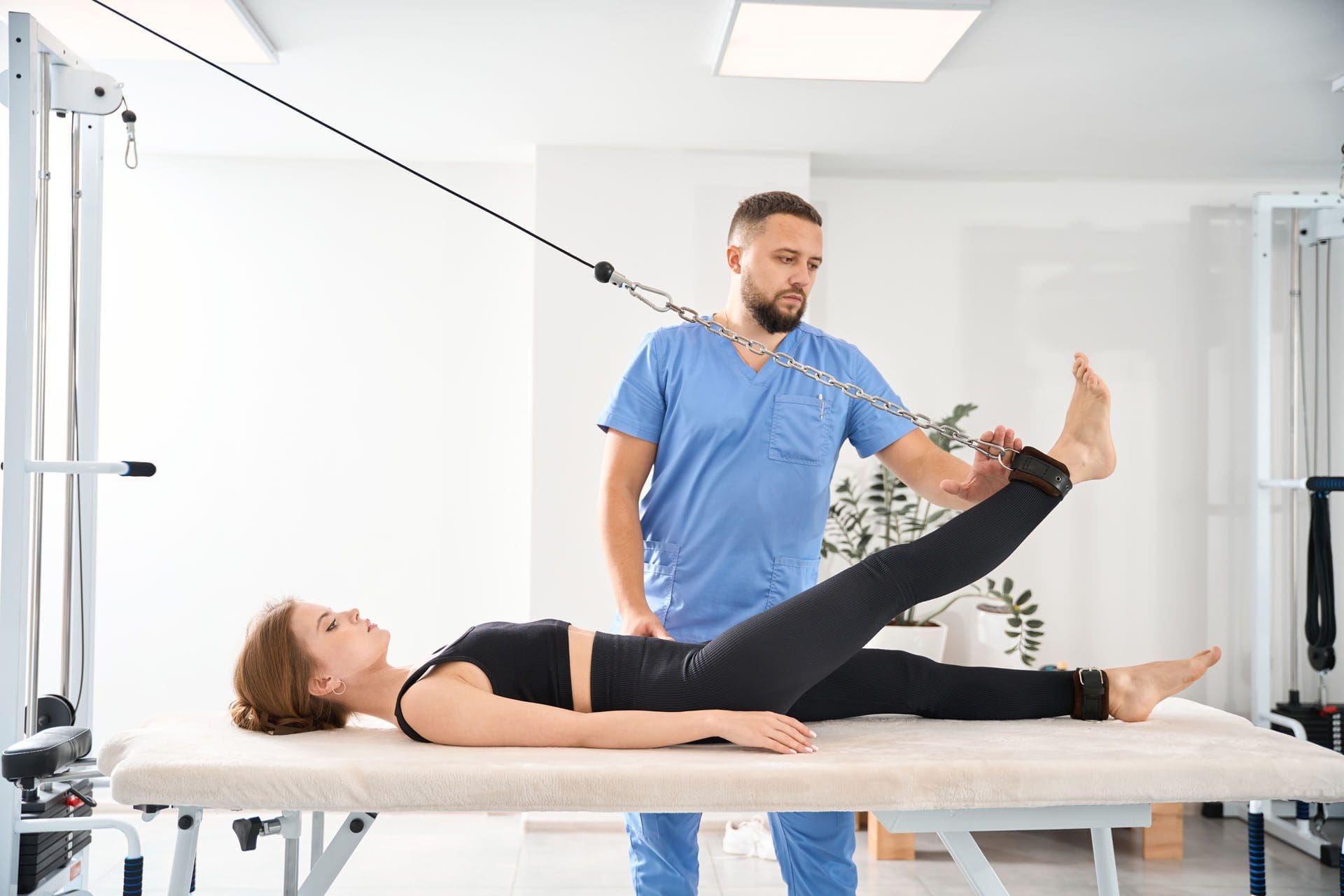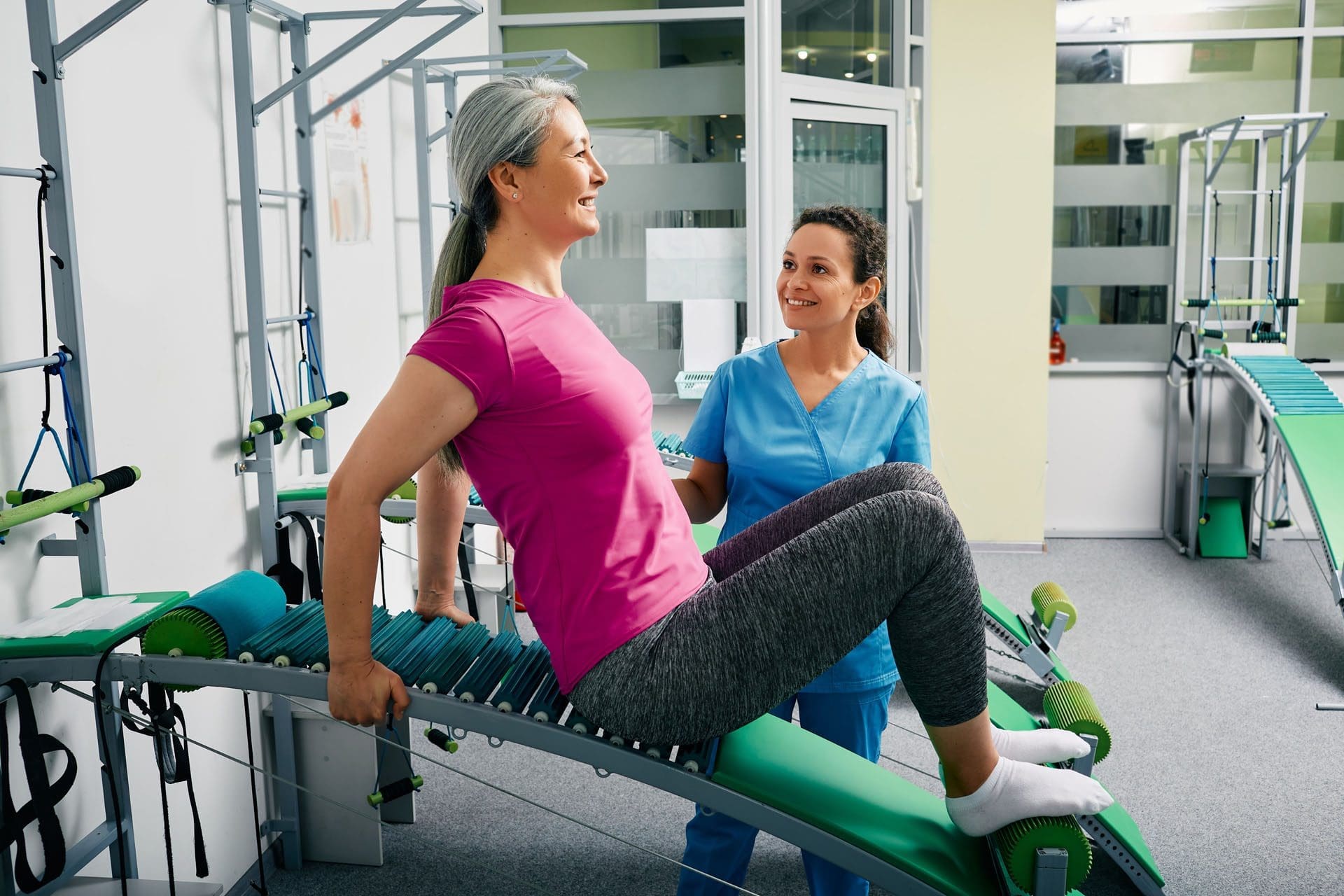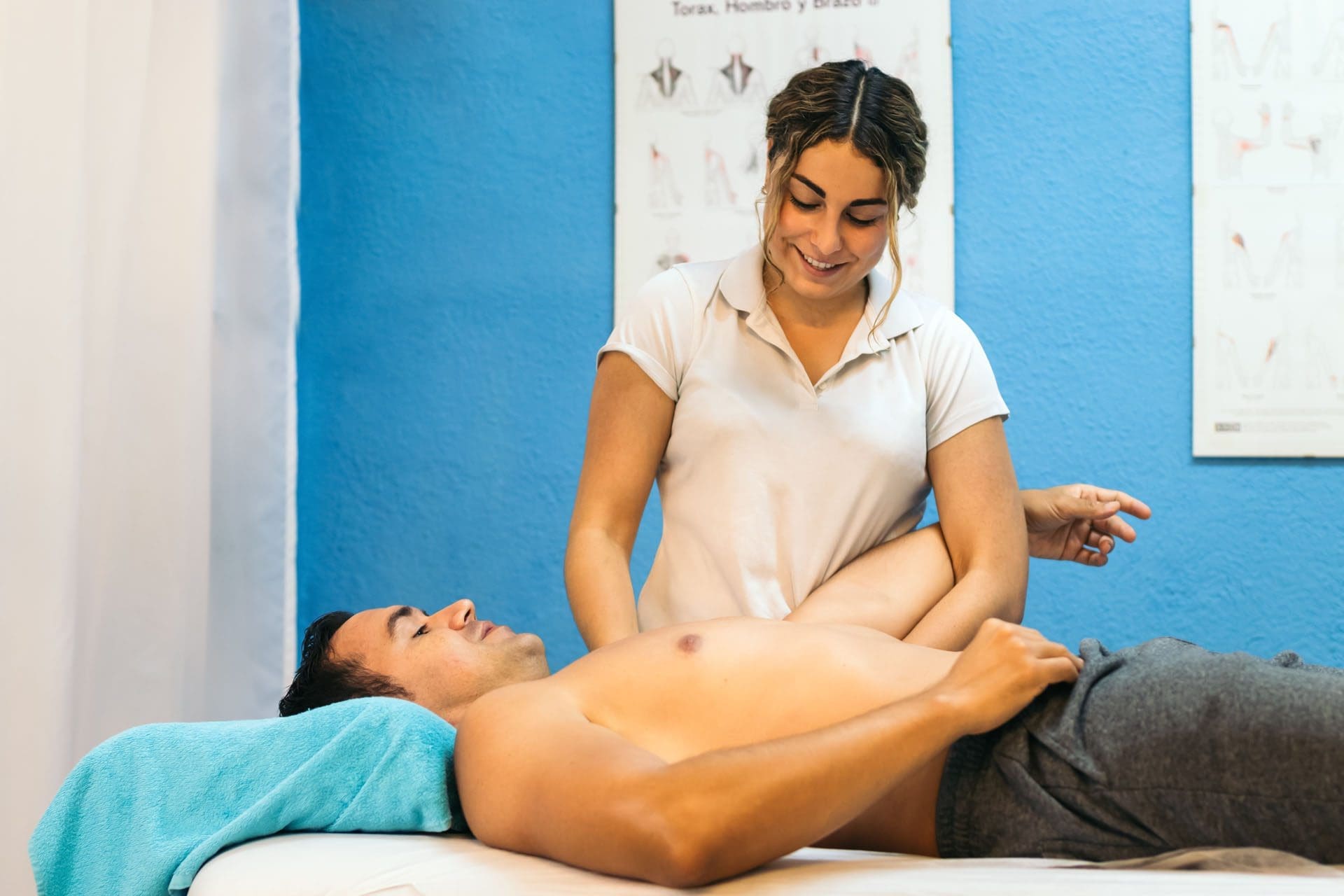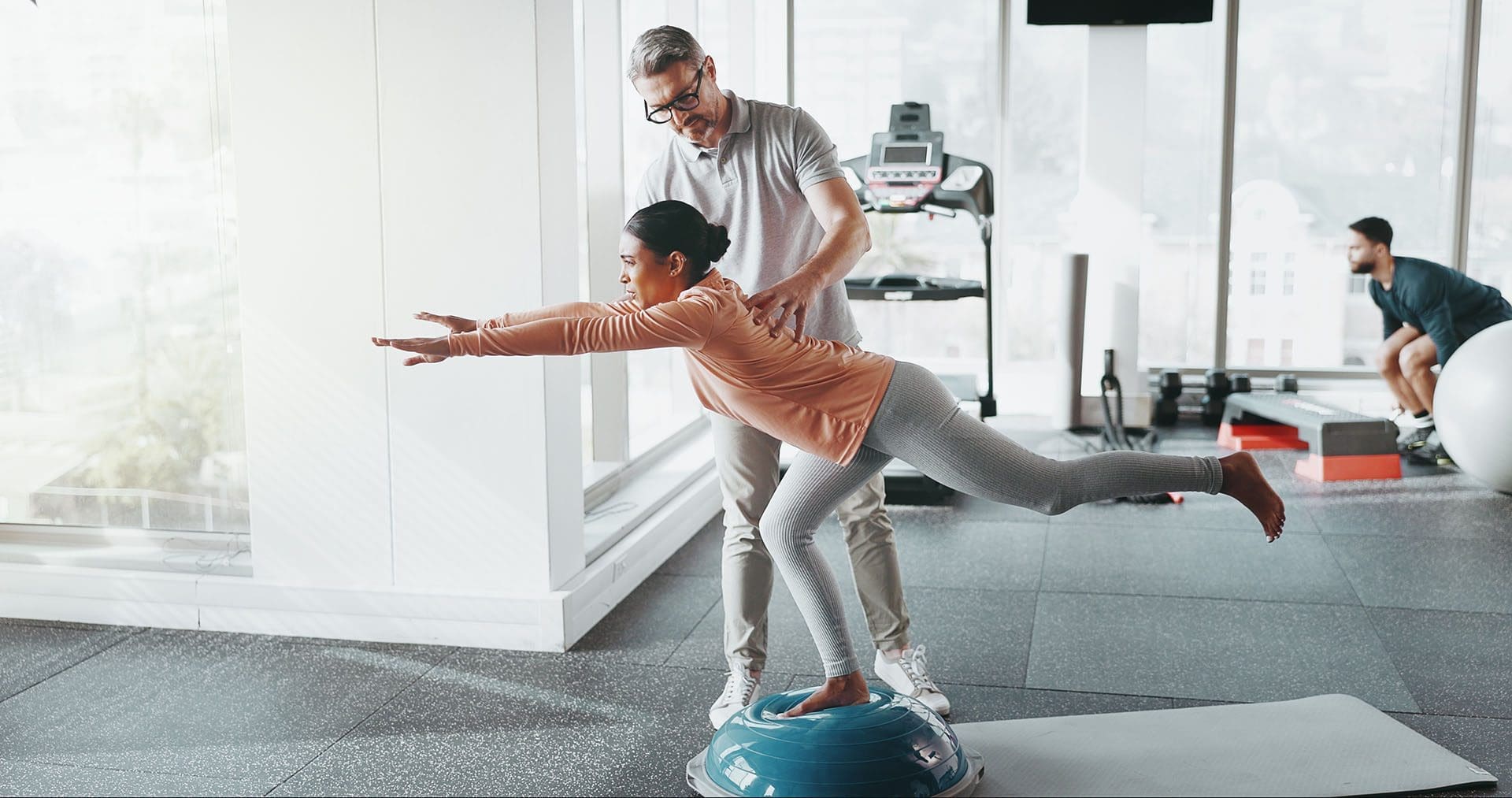Sciatica Without Low Back Pain Symptoms
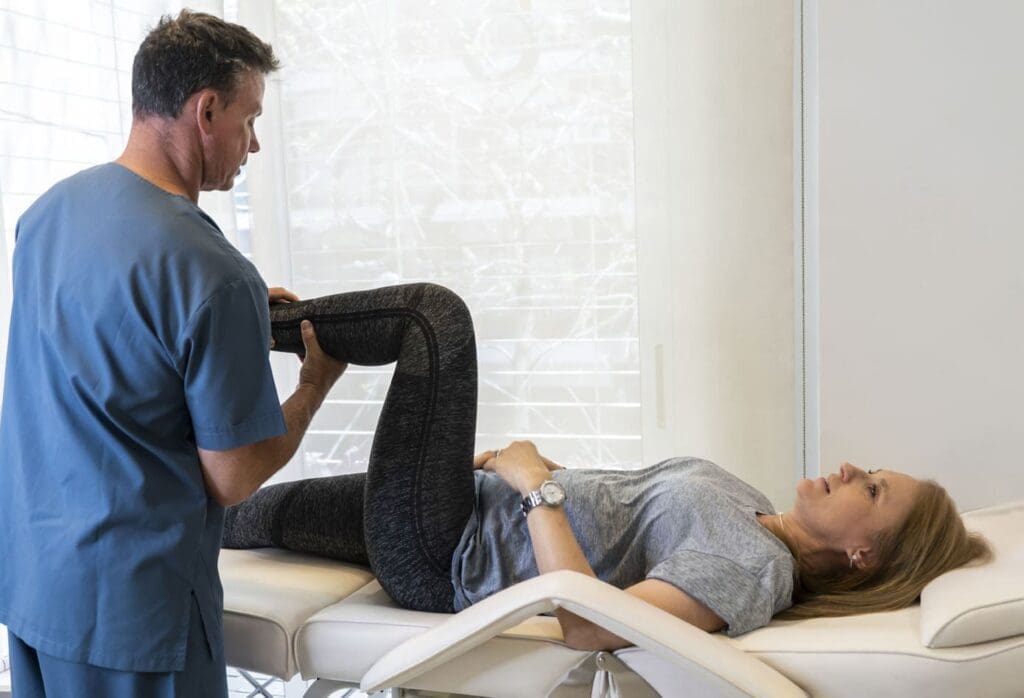
Why Your Hamstring and Foot Can Go Numb
Many people expect sciatica to feel like low back pain that shoots down the leg. But a very common (and confusing) version is this:
- Your lower back feels okay
- Your hamstring, calf, foot, or toes feel numb, tingly, or “asleep”
That can still be sciatica—or a condition that mimics sciatica. The key is understanding that sciatica is a symptom pattern, not a single diagnosis. It occurs when nerve tissue supplying the sciatic nerve pathway becomes irritated, compressed, or sensitized. (Penn Medicine, n.d.; Yale Medicine, n.d.; HSS, 2024)
At ChiroMed (chiromed.com), a practical way to approach this is to ask two questions:
- Where is the nerve getting irritated? (low back vs. buttock/hip vs. near the hamstring)
- What’s keeping it irritated? (movement habits, muscle tension, joint mechanics, posture, and load)
This article explains why leg numbness can happen without back pain, how to tell it apart from a hamstring strain, when to seek care, and how an integrative chiropractic plan can support recovery—while coordinating with medical evaluation when needed.
What “Sciatica” Really Means (Simple Definition)
Sciatica describes symptoms that follow a nerve pathway—usually from the buttock down the back or side of the leg. Symptoms may include:
- Numbness
- Tingling (“pins and needles”)
- Burning or “electric” sensations
- Sharp or aching pain
- Weakness in the leg or foot (in more serious cases) (HSS, 2024; Yale Medicine, n.d.; Penn Medicine, n.d.)
Important point:
You can have numbness and tingling with minimal pain, and you can have leg symptoms even when your low back does not hurt. (Penn Medicine, n.d.; Yale Medicine, n.d.)
Why Your Hamstring and Foot Can Go Numb Without Back Pain
People often say, “If my back doesn’t hurt, how could this be sciatica?” Here are common explanations.
The “problem spot” and the “felt spot” can be different
Nerves are like wiring. If a nerve is irritated higher up, you may feel symptoms farther down. That’s why a nerve issue can feel like a hamstring or foot problem. (Penn Medicine, n.d.; HSS, 2024)
The irritation may be in the hip or buttock region
Sometimes the sciatic nerve is irritated by muscles and connective tissue in the buttock area. A well-known example is piriformis syndrome, where deep hip muscles contribute to sciatic-type symptoms. People may feel:
- Buttock tightness
- Hamstring “numb soreness”
- Tingling in the calf or foot
- Symptoms worsen with sitting or driving (Total Ortho Sports Med, 2025)
Clinical observation used in integrative care: when the pelvis and hip are not moving well, deep hip muscles may tighten as “helpers,” which can increase nerve irritation in certain people—especially if they sit a lot, train hard, or have uneven movement patterns. (Jimenez, n.d.-a)
A spinal cause can still exist even if your back feels fine
Even without back pain, symptoms can still come from the lumbar spine, such as:
- Disc irritation (bulge/herniation)
- Narrowing around nerve roots (stenosis)
- Other mechanical or inflammatory causes (HSS, 2024; Penn Medicine, n.d.)
This is one reason careful evaluation matters: no back pain automatically rules out the spine.
The nerve may be irritated closer to the hamstring
Some people get sciatic nerve irritation near where the hamstring attaches to the high part of the pelvis. This can feel like:
- Deep buttock pain
- “Hamstring tightness” that won’t stretch out
- Tingling or numbness down the leg (Jimenez, 2025)
Sciatica vs. Hamstring Strain: How to Tell the Difference
This is one of the most common questions ChiroMed patients ask, because the symptoms can overlap.
Hamstring strain tends to look like this
- A clear injury moment (sprint, slip, kick, deadlift)
- Local pain in the back of the thigh
- Pain when you stretch the hamstring
- Pain when you contract the hamstring
- Tenderness or bruising (in some cases) (Ducker Physio, 2025)
Sciatica-type nerve symptoms tend to look like this
- Tingling, buzzing, burning, or numbness
- Symptoms that travel below the knee (often into the foot)
- Symptoms that change with posture (sitting, bending, driving)
- Sensations that feel “electric” or “deep” rather than sore-muscle pain (HSS, 2024; Ducker Physio, 2025)
Quick comparison:
- More muscle: sharp pull + local tenderness + pain with stretch
- More nerve: numbness/tingling + travel to foot + posture-dependent changes
If you are unsure, it’s safer to get assessed—because the best treatment plan depends on the true cause.
Why Numbness Deserves Respect (Even If Pain Is Mild)
Pain is loud. Numbness can be quiet, but it can signal that a nerve is not communicating well.
The American Medical Association notes that leg numbness or weakness can be an atypical symptom that warrants evaluation—especially if it progresses or is accompanied by other warning signs. (AMA, 2024)
At ChiroMed, a “rule of thumb” approach is:
- Occasional tingling that improves quickly may respond well to conservative care.
- Persistent or worsening numbness, especially with weakness, should be evaluated more urgently.
Red Flags: When You Should Seek Care Quickly
Seek urgent medical evaluation if you have:
- New or worsening leg weakness
- Foot drop (difficulty lifting the front of the foot)
- Loss of bowel or bladder control
- Numbness in the “saddle” area (inner thighs/groin)
- Severe symptoms that rapidly worsen (AMA, 2024; Penn Medicine, n.d.)
Also, schedule an evaluation soon if:
- Numbness lasts longer than 1–2 weeks
- Symptoms keep returning
- Symptoms spread farther down the leg
- You can’t work, train, or sleep normally (Penn Medicine, n.d.; HSS, 2024)
What a Good Evaluation Usually Includes
A careful sciatica-style workup often checks:
- Where symptoms travel (hamstring only vs. foot/toes)
- What triggers symptoms (sitting, bending, walking, lifting)
- Sensation, strength, and reflexes
- Hip and pelvic motion
- Nerve tension testing
- Whether imaging is needed (HSS, 2024; Penn Medicine, n.d.)
Why this matters: many conditions can look like sciatica. There are “musculoskeletal mimics” that can imitate nerve-root problems, so testing needs to be specific and organized.
ChiroMed’s Integrative Approach: What It Tries to Fix (Not Just “Chase Pain”)
When sciatica shows up mainly as hamstring and foot numbness, an integrative chiropractic plan often focuses on:
1: Reduce nerve irritation
Goal: decrease mechanical and inflammatory stress on the nerve pathway.
This may involve:
- Targeted manual therapy (joint and soft tissue)
- Position changes and activity modifications
- Gentle mobility that doesn’t flare symptoms (HSS, 2024; Yale Medicine, n.d.)
2: Restore movement in the spine–pelvis–hip chain
Goal: improve how the low back, pelvis, and hip share load.
This may include:
- Lumbar and pelvic mobility work (as appropriate)
- SI/hip mechanics support
- Posture strategies for sitting/driving (especially for desk workers) (Total Ortho Sports Med, 2025)
Clinical observations commonly emphasized in integrative settings: many recurring sciatica patterns involve combined issues—restricted hip motion, overworked deep hip muscles, and poor load sharing through the pelvis and lumbar spine—especially in active adults and people who sit long hours. (Jimenez, n.d.-a)
3: Build strength and control so symptoms don’t keep returning
Goal: stop the “flare-up cycle.”
Common focus areas:
- Glute strength/endurance (hip stability)
- Core/trunk control
- Gradual return to lifting or sport
- Movement retraining (how you hinge, squat, run, or climb) (HSS, 2024)
Common Tools Used in Integrative Chiropractic Care
Different people need different tools. The main idea is to match the tool to the driver.
Spinal and pelvic adjustments (when appropriate)
These are used to support joint motion and reduce mechanical stress in a region that may be contributing to nerve irritation. They are often paired with exercise and education rather than used alone. (Auburn Hills Chiropractic, n.d.)
Soft-tissue therapies
These may target:
- Piriformis and deep hip rotators
- Glutes
- Hamstrings (especially the upper attachment area)
- Surrounding fascia and trigger points (Total Ortho Sports Med, 2025)
Corrective exercises (the “long-game”)
These often include:
- Hip mobility drills
- Glute activation work
- Controlled hamstring loading (when appropriate)
- Core stability patterns
- Walking progression and graded exposure back to activity (HSS, 2024)
Co-management with medical evaluation when needed
Many sciatica cases respond to conservative care, but persistent numbness, weakness, or red flags may require imaging and medical management. (Penn Medicine, n.d.; AMA, 2024)
Clinical practice guidelines often support care that includes:
- Education
- Exercise-based rehab
- Manual therapy as part of a broader plan (Zaina et al., 2023)
At-Home Habits That Often Help (Simple, Practical)
These are not a diagnosis, but they can reduce flare-ups while you get evaluated.
Helpful habits
- Take short walking breaks if sitting triggers symptoms
- Avoid staying in one position too long
- Use a pillow or support to reduce slumped sitting
- Reduce aggressive stretching if it increases tingling
- Keep training “in the safe zone” (no sharp increases in symptoms) (HSS, 2024)
Things that often make it worse
- Long car rides without breaks
- Deep forward bending early on (for some people)
- “Stretching harder” into nerve symptoms
- Ignoring weakness or worsening numbness (AMA, 2024; Penn Medicine, n.d.)
What Recovery Usually Looks Like
Many people improve over weeks to a few months with conservative care and good movement habits.
A realistic recovery path often includes:
- Step 1: calm symptoms + restore comfortable motion
- Step 2: rebuild strength + improve hip/spine load sharing
- Step 3: return to normal activity with fewer flare-ups
The biggest mistake is trying to “rush” flexibility or intensity while the nerve is still irritated. For nerve symptoms, calm, consistent progress usually beats aggressive pushing.
Key Takeaways (Fast Summary)
- Sciatica can cause hamstring and foot numbness without low back pain. (Penn Medicine, n.d.; Yale Medicine, n.d.; Total Ortho Sports Med, 2025)
- Causes can include hip/buttock-region irritation (piriformis-related), lumbar nerve root irritation, or local nerve irritation near the hamstring. (HSS, 2024; Jimenez, 2025)
- Numbness and weakness matter, especially if worsening or paired with red flags. (AMA, 2024)
- An integrative plan—like the approach used at ChiroMed—often combines manual care, soft-tissue work, and corrective exercise to restore movement, reduce nerve stress, and prevent repeat flare-ups. (Zaina et al., 2023)
References
American Medical Association. (2024, November 15). What doctors wish patients knew about sciatica. https://www.ama-assn.org/public-health/prevention-wellness/what-doctors-wish-patients-knew-about-sciatica
Auburn Hills Chiropractic and Rehabilitation. (n.d.). How chiropractic adjustments can treat sciatica. https://auburnhillschiro.com/how-chiropractic-adjustments-can-treat-sciatica/
Bateman, E. A., et al. (2024). Musculoskeletal mimics of lumbosacral radiculopathy. PM&R. https://pmc.ncbi.nlm.nih.gov/articles/PMC11998970/
Ducker Physio. (2025, April 8). Tell the difference between sciatica & hamstring pain. https://www.duckerphysio.com.au/blog/difference-sciatica-and-hamstring-pain
Hospital for Special Surgery. (2024, May 24). Sciatica: Simple symptoms, complex causes. https://www.hss.edu/health-library/conditions-and-treatments/list/sciatica
International Association for the Study of Pain. (n.d.). Surgical or non-surgical management for sciatica. https://www.iasp-pain.org/publications/relief-news/article/management-for-sciatica/
Jimenez, A. (n.d.-a). Sciatica vs piriformis syndrome explained. https://dralexjimenez.com/sciatica-el-paso-chiropractor/sciatica-vs-piriformis-syndrome-explained/
Jimenez, A. (2025). Hamstring syndrome relief and muscle recovery. https://dralexjimenez.com/hamstring-syndrome-relief-and-muscle-recovery/
Penn Medicine. (n.d.). Sciatica. https://www.pennmedicine.org/conditions/sciatica
Total Ortho Sports Med. (2025, December 5). Sciatica with no back pain. https://www.totalorthosportsmed.com/sciatica-with-no-back-pain/
Yale Medicine. (n.d.). Sciatica. https://www.yalemedicine.org/conditions/sciatica
Zaina, F., et al. (2023). A systematic review of clinical practice guidelines for low back pain with and without radiculopathy. Archives of Physical Medicine and Rehabilitation. https://pubmed.ncbi.nlm.nih.gov/36963709/

